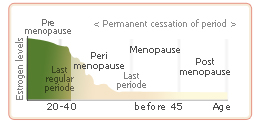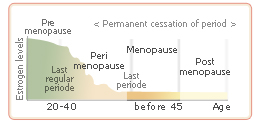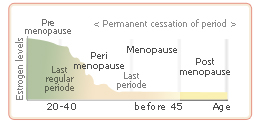What is menopause?
 Menopause occurs when the production of estrogen and progesterone, the two main hormones in the female reproductive system, changes dramatically. After menopause, women can no longer have children, and may become more prone to some diseases. Most women experience menopause at the age of 50; according to some studies, even ancient cultures described menopause as occurring around this age. Menopause occurs when the production of estrogen and progesterone, the two main hormones in the female reproductive system, changes dramatically. After menopause, women can no longer have children, and may become more prone to some diseases. Most women experience menopause at the age of 50; according to some studies, even ancient cultures described menopause as occurring around this age.
Menopause is a natural event. Defined as the final menstrual period, it is confirmed when a woman has not had her periods for 12 successive months. Menopause is also associated with irregular ovary function due to aging, resulting in lower levels of progesterone and estrogen hormones. This is the permanent end of fertility. During this transition, from the reproductive cycle through menopause and postmenopause, a woman experiences various physical changes.
Most of these changes, or "symptoms," are the normal consequences of menopause and aging. Some of the typical symptoms related to menopause include hot flashes, vaginal dryness, night sweats and more. Herbs for menopause are often used to treat these symptoms.
All women experience menopause, but each in a unique way. Some studies suggest that a woman's response to menopause symptoms may be similar to how her mother experienced them. A woman's understanding of menopause may also be a factor. The variation in menopause experience in different parts of the world and among different ethnic groups suggests both cultural and genetic influences.
Menopause can often be merely the discontinuation of menstrual periods. A woman may view the end of fertility as liberation from concerns about birth control, or she may grieve for the children she never had. Menopause may be seen as a sign of aging, which may cause distress in a society that values youth and fertility.
The intensity of menopause symptoms will also influence a woman's view of menopause. Some women will have troublesome symptoms, whereas others may navigate this transition with few or even no symptoms at all. Fortunately, today menopause is better understood and more openly discussed than ever before. Women just entering the menopause transition will benefit from knowing that women who have completed the transition look back on menopause as a passageway to a new part of life. Most report that they now feel more confident, empowered, involved, and energized than they did in their younger years.
Menopause stages
The intensity of menopause symptoms will also influence a woman's view of menopause. Some women will have troublesome symptoms and will need to turn to herbs for menopause for help, whereas others may navigate this transition with few or even no symptoms at all.
Premenopause
 Refers to the entirety of a woman's life, from her first to her last regular menstrual period. Premenopause is best defined as a time of "normal" reproductive function in a woman, leading into the next stage of menopause called perimenopause. Refers to the entirety of a woman's life, from her first to her last regular menstrual period. Premenopause is best defined as a time of "normal" reproductive function in a woman, leading into the next stage of menopause called perimenopause.
In some cases, women experienced symptoms of perimenopause several years before menopause occurs. The age when the signs of premenopause occur varies among women. Some women experience the symptoms of perimenopause in their early thirties (during their premenopause stage), while other women may notice menopausal signs in their forties. Some women may never experience any changes during menopause.
Women have to remember that during premenopause stage, they keep regularly having their periods.
Perimenopause
 Perimenopause literally means "around menopause." This phase of two to ten years before the total cessation of the menstrual cycle is generally experienced by women from 35 to 50 years old. The hormonal fluctuations that characterize this stage of menopause trigger common menopause symptoms such as hot flashes, which can effectively be treated with herbs for menopause. Perimenopause literally means "around menopause." This phase of two to ten years before the total cessation of the menstrual cycle is generally experienced by women from 35 to 50 years old. The hormonal fluctuations that characterize this stage of menopause trigger common menopause symptoms such as hot flashes, which can effectively be treated with herbs for menopause.
The World Health Organization (WHO) monograph "Research on the Menopause in the 1990s" gives the best definition of perimenopause: "The term perimenopause should include the period immediately before the menopause (when the endocrinological, biological and clinical features of approaching menopause commence) and the first year after menopause." The WHO employs the term "menopausal transition" to indicate only the stage of perimenopause before the final menstrual period.
Menopause
 Representing the end stage of a natural transition in a woman's reproductive life, menopause is the point at which estrogen and progesterone production decreases permanently to very low levels. The ovaries stop producing eggs, and a woman is no longer able to get pregnant naturally. Representing the end stage of a natural transition in a woman's reproductive life, menopause is the point at which estrogen and progesterone production decreases permanently to very low levels. The ovaries stop producing eggs, and a woman is no longer able to get pregnant naturally.
You are in menopause if you have not had a menstrual period for 12 months in a row. Menopause may also be determined by blood tests, a pelvic exam or pap smear, which can show the effects of low estrogen levels in your body.
Postmenopause
 Refers to a woman's time of life after menopause has occurred. It is generally believed that the postmenopausal phase begins when 12 full months have passed since the last menstrual period. From now a woman will be postmenopausal for the rest of her life. Refers to a woman's time of life after menopause has occurred. It is generally believed that the postmenopausal phase begins when 12 full months have passed since the last menstrual period. From now a woman will be postmenopausal for the rest of her life.
Other Stages
Early menopause is another stage related to menopause, but this stage is only caused by external problems or internal disorders.
Early Menopause
Women typically experience menopause at an average age of 51. Roughly one percent of women, however, may notice early menopause symptoms before the age of 45. Women who go through menopause while still in their early 20s, 30s or 40s, are said to experience early menopause.
The causes for early menopause are:
Autoimmune Disorder
The immune system is intended to protect the body from disease and infection. However, an autoimmune disorder can cause the immune system to attack a part of its own reproductive system. This can damage the ovaries and inhibit them from producing the hormones that regulate the reproductive system (estrogen and progesterone).
Chromosomal Irregularity
A genetic condition known as "fragile X syndrome" can cause symptoms of early menopause. Fragile X syndrome occurs when one of the X chromosomes is defective. Only one of a woman's two X chromosomes is active, but a fault in either one can cause early menopause.
Radiation Therapy and/or Chemotherapy
Cases of early menopause have increased as intense cancer treatments have become more common. The considerable amounts of radiation in chemotherapy used to destroy cancer cells can also damage the ovaries, resulting in early menopause.
Total Hysterectomy and Oophorectomy
Women can go through early menopause after the surgical removal of both ovaries (bilateral oophorectomy) or after a total hysterectomy (removal of the uterus, both fallopian tubes, and both ovaries). Ovaries produce hormones, so when ovaries are removed levels of estrogen and progesterone drop, resulting in early menopause.
Ovarian Damage Due to Other Surgical Procedures
After a hysterectomy in which one ovary is left intact, there have been cases of the remaining ovary failing. This occurs when the ovary is damaged or otherwise impaired by operations such as cyst removal. The follicles on the remaining ovary will slowly die out, leading to early menopause.
Which herb should women try? Today women are looking for relief from their menopause symptoms with herbs. Phytoestrogenic herbs and non-estrogenic herbs are good in relieving menopause symptoms, but recent studies show that non-estrogenic herbs have no side effects because they help the body to produce its own hormones instead of introducing hormones like the phytoestrogenic ones. Learn more about non-estrogenic herbs for menopause.
| 

